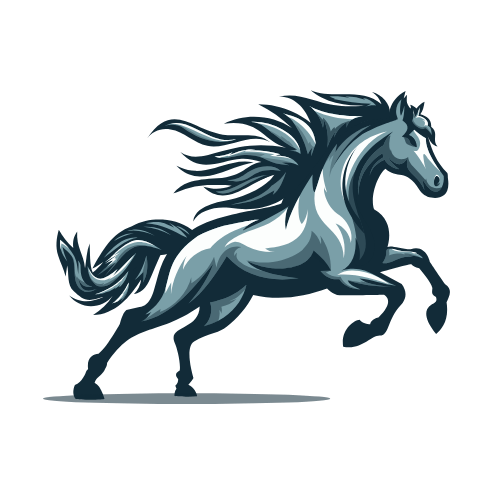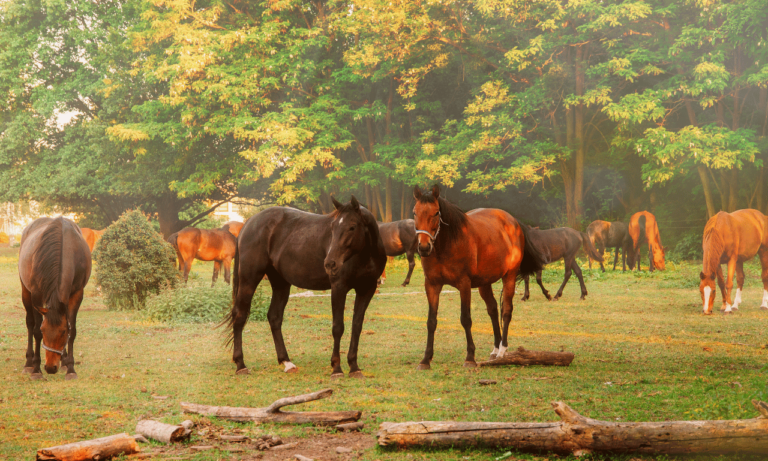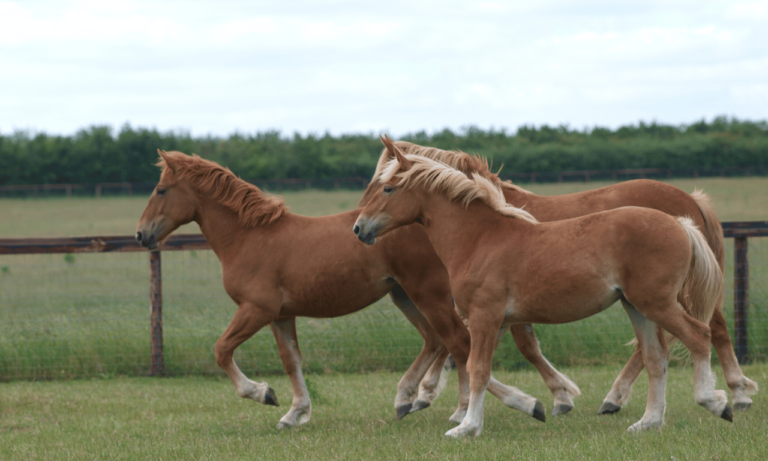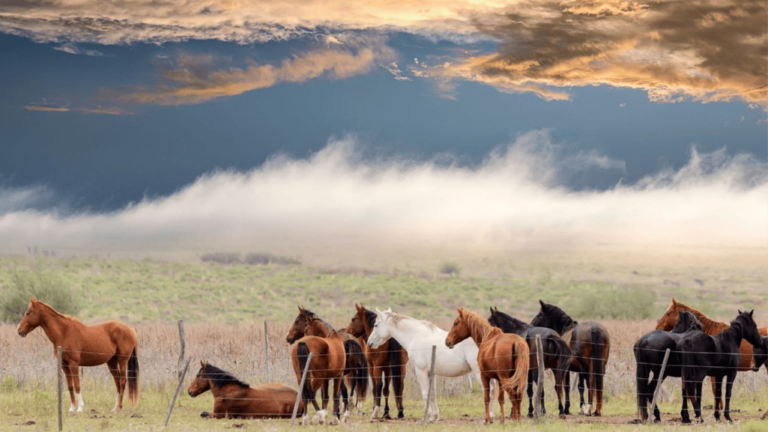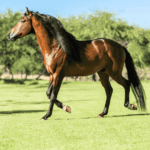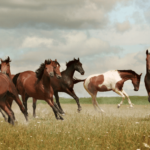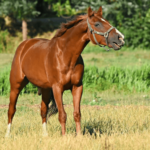Starting your journey with horse ownership is thrilling and rewarding. Yet, it’s vital to grasp the financial obligations involved. The cost of owning a horse goes beyond the initial purchase price. It includes housing, feed, veterinary care, and equipment, among other expenses.
The initial cost of buying a horse varies widely. It depends on the breed, age, and training level. However, the ongoing expenses are what really need your attention. Housing costs are usually the biggest part of your budget. Then there are feed and hay expenses, which can change due to location and season.
Veterinary care is a key part of horse ownership. It includes regular check-ups, vaccinations, and dental care. Hoof maintenance by a skilled farrier is also crucial for your horse’s health and performance. Don’t forget to include the costs of tack, riding equipment, and transportation in your budget. These can vary a lot based on your preferences and the discipline you’re into. How Much Does a Horse Costs?
Figuring out the true cost of owning a horse might seem overwhelming. But it’s a necessary step to ensure you’re ready for the financial duties of horse care. By considering all the costs and making a detailed budget, you can start your horse-owning journey with confidence. This way, you can give your horse the best care possible.
Key Takeaways
- The initial horse purchase cost is just the beginning of the expenses associated with horse ownership.
- Boarding and housing are often the most significant ongoing costs for horse owners.
- Feed, hay, and veterinary care are essential expenses that can vary based on regional factors and individual horse needs.
- Equestrian equipment, tack, and transportation costs should be factored into the overall budget.
- Careful budgeting and financial planning are crucial for ensuring a positive and responsible horse ownership experience.
Factors Affecting Horse Purchase Prices
When looking to buy a horse, it’s key to know what affects the price. Things like breed, age, and training level all matter. Each of these factors can change how much you’ll pay for your new horse.
Breed and Pedigree
The breed of a horse can really impact its price. For example, Thoroughbreds, Arabians, and Warmbloods are often pricier. This is because they’re known for their skill in different equestrian sports.
Pedigree also matters a lot. Horses with famous parents and a history of success cost more. The fame and achievements of a horse’s parents can raise its value.
Age and Training Level
The age of a horse is another big factor. Young horses, especially those well-trained, are usually more expensive. This is because they have a longer career ahead of them.
Training level is also important. Horses that know basic commands and have experience in their sport cost more. Those ready for higher-level competitions are even pricier.
Performance Record and Potential
A horse’s past achievements and future potential also affect its price. Horses that have done well in competitions are more expensive. Their success shows they can perform at a high level.
Even without a long history of success, a horse with great potential can still cost a lot. Young horses with good looks, movement, and attitude are priced higher for their future in shows or breeding.
| Factor | Impact on Price |
|---|---|
| High-Performance Breeds (Thoroughbreds, Arabians, Warmbloods) | Higher prices due to exceptional abilities and versatility |
| Prestigious Pedigree and Bloodlines | Increased value based on reputation and success of sire and dam |
| Younger Horses with Solid Training | More expensive than older horses due to longer potential career |
| Advanced Training Level | Higher prices for horses ready to compete at higher levels |
| Proven Performance Record | Increased value for horses with success in competitions |
| Exceptional Potential in Young Horses | Higher prices based on future prospects in show ring or breeding |
Knowing these factors can help you find the right horse. Think about breed, age, training, and potential. This way, you can find a horse that fits your budget and riding goals.
Initial Purchase Price Range
When looking to buy a horse, knowing the different price ranges is key. You can find horses that fit any budget, from affordable to high-end. This means there’s a horse for everyone, no matter your budget.
Budget-Friendly Options: $500 to $3,000
If you’re new to horse ownership or have a small budget, there are still great options. Horses in the $500 to $3,000 range are often younger or older with some health issues. They might need more work but can be wonderful companions or project horses.
First-time horse buyers usually spend between $1,500 and $3,000. This range offers a good selection of horses.
Mid-Range Horses: $3,000 to $10,000
In the $3,000 to $10,000 range, you’ll find horses with more training and proven skills. These horses balance age, training, and potential well. Many riders find their perfect match here, offering a great value without a high cost.
| Breed | Average Price Range |
|---|---|
| Clydesdale | $2,500 to $5,000 |
| Thoroughbred | $1,000 to $10,000 |
| Appaloosa | $1,000 to $10,000 |
| Morgan | $1,000 to $5,000 |
High-End Equines: $10,000 and Up
For top performance horses or exceptional breeding, prices can soar. Horses over $10,000 are often for serious competition and have impressive lineage. These elite horses come from places like Europe, known for their equestrian excellence. They offer unmatched potential in their disciplines.
It’s important to know your budget and what you want when buying a horse. Understanding your goals and the costs of owning a horse helps find the right horse for you.
Additional Costs Associated with Buying a Horse
Starting your journey to own a horse is exciting. But, it’s key to think about more than just the price. You need to budget for all the extra costs. This helps you get ready for the financial side of owning a horse.
Pre-Purchase Veterinary Exam
Getting a horse? First, get a vet check. A vet will look over the horse’s health. This can cost between $250 to $2,000, based on where you are and what tests are done.
Transportation and Shipping Fees
After picking your horse, you need to get it home safely. If you don’t have a trailer, here are your options:
- Hire a pro to transport your horse for $0.75 to $3 per mile.
- Ask a trainer to pick up the horse for you. Costs vary by region and distance (usually $0.75-$1.25 per mile).
Remember to include these costs in your budget for owning a horse.
Sales Tax and Registration
Don’t forget about sales tax and registration fees. These costs change based on where you live. Sales tax for horses is usually 5% to 10%. You might also need to register your horse, which has its own fees.
Thinking about these extra costs helps you plan better for your horse’s care. Owning a horse means more than just buying it. It’s about the ongoing costs to keep your horse happy and healthy.
Boarding and Stabling Expenses
Boarding and stabling costs are a big part of caring for a horse. Keeping your horse at home might seem cheaper, but boarding has many benefits. It’s great for new horse owners because it offers help with daily care and travel freedom.
Horse boarding fees change based on the type and location. In the U.S., monthly costs range from $300 to $700, says the American Horse Council. Full-care boarding, which includes daily care, costs between $300 and $700 a month. Partial boarding, where you share some duties, is about $150 to $300 a month.
| Boarding Type | Average Monthly Cost |
|---|---|
| Full-care boarding | $300 – $700 |
| Partial boarding | $150 – $300 |
| Pasture boarding | $150 – $400 |
| Self-care boarding | $100 – $200 |
Pasture boarding, which gives access to a shared pasture, costs about $150 to $400 a month. Self-care boarding, where you handle all care, is the cheapest, costing $100 to $200 a month.
Luxury full-care facilities can cost up to $2,000 a month. Standard facilities charge between $300 and $700 for full-care boarding. When planning your horse care budget, think about what you need and what different facilities offer.
Boarding can provide peace of mind and valuable support, especially for new horse owners, making it a worthwhile investment in your horse’s well-being.
Buying land and building a barn for your horse might seem expensive upfront. But, consider the long-term costs and benefits of boarding versus keeping your horse at home. The best choice depends on your situation, budget, and horse care goals.
Feed and Hay Costs
Keeping your horse healthy means giving them a good diet. Feed and hay costs can add up quickly. On average, owners spend $200 to $400 a month on feed. Prices vary based on where you live, with more hay in some areas making costs lower.
Horses that are more active or have health issues might need special food. While this can be more expensive, it’s better for their health in the long run. Not feeding them right can lead to weight problems and health issues like colic or ulcers.
Hay: $1,080 to $3,600 per Year
Hay is key for a horse’s diet, and its price changes a lot. Owners spend between $1,080 and $3,600 a year on hay. A study showed that feeding hay and grain costs about $1,214 over nine months.
Most adult horses eat 1.5-2% of their body weight in hay every day. This means a 1,000-pound horse might eat up to 2.7 tons of feed each year.
| Hay Type | Average Cost per Bale | Daily Cost (Half Bale) |
|---|---|---|
| Grass Hay | $5 – $15 | $2.50 – $7.50 |
| Alfalfa Hay | $15 – $20 | $7.50 – $10 |
| Mixed Hay | $10 – $18 | $5 – $9 |
Feed: $504 to $1,008 per Year
Besides hay, horses often need extra feed for nutrition. The cost of grain can be from $10 to $30 or more per bag. Owners spend an average of $504 to $1,008 a year on feed.
What your horse eats depends on their age, how active they are, and their health. Working with a nutritionist can help find a good balance for your horse’s diet. This ensures they stay healthy and perform well.
It’s important to keep an eye on your horse’s health and weight. This helps make sure they get the right amount of food. By being informed about your horse’s diet, you can manage costs and keep them healthy for a long time. Good nutrition is key to responsible horse care and can prevent expensive vet bills later on.
Routine Health Care and Veterinary Expenses
As a responsible horse owner, taking care of your equine friend is key. Routine health care and vet bills are big parts of horse care costs. They help keep your horse healthy, happy, and ready for adventures.
Yearly vet care for horses usually costs between $350 and $600, not counting emergencies. This includes yearly check-ups, shots, deworming, and tests. But, if you compete or do intense activities, more care is needed, raising costs.
Annual Vaccinations and Deworming
Keeping your horse safe from diseases is crucial. Vaccinations are key, and they add to vet costs. A set of core shots, like tetanus and rabies, can cost $75 to $150 a year.
Deworming is also vital for your horse’s health. It costs between $20 and $50 a year, depending on the product and how often it’s used.
Dental Care and Hoof Maintenance how much does a horse cost
Dental care is important for your horse’s health. Regular check-ups and tooth filing prevent pain and help digestion. Dental visits can cost $75 to $200, with most horses needing them every 6 to 12 months.
Hoof care is also critical. Farrier visits keep hooves healthy and prevent lameness. Costs vary by need and whether shoes are used. Basic trimming costs $45 to $80, and shoeing is $90 to $300 per visit.
| Veterinary Service | Average Annual Cost |
|---|---|
| Routine Veterinary Care | $350 – $600 |
| Core Vaccinations | $75 – $150 |
| Deworming | $20 – $50 |
| Dental Care (per visit) | $75 – $200 |
| Routine Farrier Costs | $300 – $2,000 |
Understanding and planning for these costs helps your horse stay healthy. While horse care can be expensive, the joy and companionship they offer are priceless.
Equipment and Tack Investments
Buying quality horse care equipment and tack is key for every horse lover. This includes saddles, bridles, grooming tools, and transport gear. These costs can add up fast, so it’s important to budget well for your tack needs.
Saddles, Bridles, and Grooming Supplies
Saddles and bridles are big costs in horse care. An English saddle can cost between $100 and over $7,000. Western saddles usually cost between $200 and $3,000. Saddle pads and blankets can range from $20 to $400+, depending on the style and quality.
Girths, cinches, and stirrups are also vital. They can cost from $20 to $350+ for English and $20 to $300+ for Western. Bridles and headstalls range from $40 to $1,200+, with reins from $8 to $250+.
Grooming tools like brushes, combs, and hoof picks are crucial for your horse’s health and look. Even though they seem cheap, they can add up over time.
| Tack Item | English Riding | Western Riding |
|---|---|---|
| Saddle | $100 to $7,000+ | $200 to $3,000+ |
| Saddle Pad/Blanket | $20 to $350+ | $30 to $400+ |
| Girth/Cinch | $30 to $350+ | $25 to $300+ |
| Stirrups | $20 to $400+ | $20 to $250+ |
| Bridle/Headstall | $40 to $500+ | $40 to $1,200+ |
| Reins | $20 to $250+ | $8 to $100+ |
Horse Trailers and Transportation Equipment
Safe and comfy horse transport needs a good trailer and a strong towing vehicle. Trailers vary in size and style, costing from a few thousand to over $50,000. Your towing vehicle must be strong enough for the trailer and horses.
When looking for horse tack that includes all necessary items, the total investment can span from $250 to $9,590+ on average.
In summary, the costs of equestrian gear and horse care equipment are big. Knowing the prices for tack and transport helps plan your investments. This ensures you have the right gear for your equestrian life.
Training and Lessons
Getting the right horse training is key for a good horse partner. The cost depends on the trainer’s skill, the horse’s age, and the training level. On average, 30 days of training costs about $1,000. More extensive programs can cost between $3,000 and $6,000 or more.
Remember, rushing training can cause problems later. Fixing a horse that was trained too fast can take months and cost thousands. Owners might spend more on fixing the horse than they paid for it. Issues like tightness, pain, and behavior problems can also arise, needing more vet care or special treatments.
Lessons for horse riding are also a big part of horse care costs. Private lessons cost about $120 an hour, with prices from $45 to $100 based on the instructor and location. Semi-private lessons, with two to three riders, cost between $45 and $85 per person. Group lessons with four or more riders cost between $30 and $80 per person.
Lesson prices can go up on weekends and in busy seasons. You might also have to pay extra for riding gear. Some instructors offer discounts for buying lessons in bulk. Others might charge for canceling or being late. Look for an instructor with experience and affiliations like the American Riding Instructors Association.
| Lesson Type | Average Cost | Cost Range |
|---|---|---|
| Private Lessons | $120 per hour | $45 – $100 |
| Semi-Private Lessons | $65 per person | $45 – $85 |
| Group Lessons | $55 per person | $30 – $80 |
| Kids’ Lessons | $55 per session | $30 – $80 |
Investing in good horse training and education can save you money in the long run. Spending enough time and money on training a horse can lead to a happier, healthier horse. This makes for a more enjoyable and cost-effective equestrian experience.
Insurance and Liability Coverage
When you think about the cost of owning a horse, remember insurance and liability coverage. These are optional but offer great peace of mind. They protect you from unexpected costs related to your horse’s health. Horse insurance costs vary, but the right policy can save you money in the long run.
Equine Mortality and Major Medical Insurance
Equine mortality insurance covers your horse’s death from accident, illness, or disease. It pays out the horse’s market value or a set amount. Major medical insurance covers vet costs for injuries or illnesses up to a certain amount. These are key for sport horses, where costs can be high.
When picking an insurance policy, think about:
- Age limits: Most policies cover horses from 30 days to 20 years old. Older horses cost more.
- Coverage limits: Make sure the payout matches your horse’s value and the medical coverage meets your needs.
- Exclusions: Know about any conditions or situations that might not be covered.
Liability Insurance for Horse Owners
Equine liability expenses can add up fast. Liability insurance is key for horse owners. It protects you if your horse hurts someone or damages their property. It covers legal costs and compensation, offering financial security.
Liability insurance is crucial if you:
- Run a horse-related business, like a stable or farm
- Compete in equestrian events
- Let others ride or interact with your horse
There are also specialized policies. Care, Custody, and Control insurance protects you when caring for horses you don’t own. Equine property insurance covers damaged or stolen tack and equipment.
| Insurance Type | Annual Cost | Coverage |
|---|---|---|
| Mortality | $200 – $1,000 | Death due to accident, illness, or disease |
| Major Medical | $300 – $1,500 | Veterinary treatment for injuries or illnesses |
| Liability | $150 – $500 | Accidental injury to others or property damage |
| Property | $100 – $500 | Damage or loss of tack, equipment, and facilities |
Horse owner protection through insurance is an investment in your peace of mind and financial stability. While the costs may seem daunting, the security and support provided by a comprehensive policy can be invaluable in the face of unexpected challenges.
By carefully considering your insurance needs and selecting the right coverage, you can safeguard your equestrian pursuits and enjoy the rewarding experience of horse ownership with confidence.
Budgeting for Unexpected Expenses
As a responsible horse owner, it’s key to plan for the unexpected in equine financial planning. Studies show horse owners often underestimate costs by up to 363%. Over half of owners feel stressed by bills under $1,500. This highlights the need for an emergency fund for your horse.
In the last year, two-thirds of owners spent on emergency vet care for their horses. This shows the need for horse care contingencies. The cost for horses varies from $11,538 for retired horses to nearly $37,000 for competition horses. While 83% of owners feel prepared, only one-third have a savings plan for horse emergency funds.
“By failing to prepare, you are preparing to fail.” – Benjamin Franklin
Research shows horses with colic surgery have a 75.6% survival rate within eight hours. This rate drops to 45.1% after 12-plus hours. This highlights the need for quick access to funds in emergencies. Experts suggest saving three to six months’ worth of expenses in an equine savings account.
It’s also important to consider the impact of changes in the equine food crop market on your equine financial planning. Between 2017 and 2023, there was a 15.2% decrease in planted acreage for equine food crops in the U.S. This raises concerns about potential scarcity and increased costs of hay for horse owners.
When budgeting for your horse’s needs, consider the following factors:
- Regular veterinary check-ups and vaccinations
- Dental care and hoof maintenance
- Feed, hay, and pasture costs
- Equipment maintenance and replacement
- Training and lesson fees
- Insurance premiums
- Unexpected medical emergencies
| Category | Annual Cost Range |
|---|---|
| Retired Backyard Horse | $11,538 |
| Competition Horse | Up to $37,000 |
By setting aside funds for horse emergency funds and regularly reviewing your equine financial planning, you can be ready for any horse care contingencies. Remember, your horse’s well-being depends on your ability to provide for their needs, both expected and unexpected.
Conclusion
Owning a horse is a big equestrian investment that needs a lot of thought. The costs start with the purchase price and go up with boarding, feed, vet care, and gear. The monthly costs can be from a few hundred to thousands of dollars.
The average cost for a horse used for fun is about $3,000. But, high-end horses can cost over $10,000. You also need to think about tack, transport, and training costs.
Monthly costs for a horse depend on many things. This includes the boarding, the horse’s diet, and health care. Boarding can cost from $100 for pasture to over $1,600 for full-service. Feed and hay can cost between $130 and $290 a month.
Adding vet care and farrier services can increase your monthly costs by $100 to $450. Despite the big costs, many find joy in owning a horse. The companionship, thrill of riding, and personal growth are worth it.
By budgeting well and planning for surprises, you can enjoy a good relationship with your horse. The real value of owning a horse isn’t just the money spent. It’s the memories and connections you make.
FAQ
What is the average cost of buying a horse?
What additional costs are associated with buying a horse?
FAQ
What is the average cost of buying a horse?
The price of a horse varies a lot. It depends on the breed, age, training, and performance. You might spend $500 to $3,000 for a basic horse. Mid-range horses cost $3,000 to $10,000. Top horses with great pedigrees and records can cost over $10,000.
What additional costs are associated with buying a horse?
Buying a horse comes with extra costs. You’ll need a pre-purchase veterinary exam, which can be $250 to $2,000. There are also shipping fees, around $0.75-1.25 per mile. Plus, you’ll have to pay sales tax and registration fees.
How much does it cost to board a horse?
Boarding costs change based on the facility and care level. Pasture board is about $100 monthly or $1,200 yearly. Stall boarding at a barn can be $400 to $1,000 monthly or $4,800 to $12,000 yearly.
What are the costs associated with feeding a horse?
Hay costs can be $90 to $300 monthly or $1,080 to $3,600 yearly, based on type and location. Grain or concentrate feed costs about $42 to $84 monthly or $504 to $1,008 yearly.
How much should I budget for routine health care and veterinary expenses?
Routine care for your horse, like vaccinations and dental care, costs about $50 monthly or $600 yearly. This can change based on your horse’s needs and any extra treatments.
What kind of equipment and tack do I need to buy for my horse?
You’ll need a saddle, bridle, grooming tools, and stable equipment. Costs vary by quality and brand. Budget at least $1,000 to $2,000 for initial purchases. A horse trailer can cost several thousand dollars if you plan to transport your horse.
Should I invest in insurance for my horse?
Equine insurance offers financial protection for accidents or illnesses. Policies for mortality and major medical can cost hundreds yearly. Liability insurance is also a good idea to protect against legal claims.
How can I budget for unexpected expenses related to horse ownership?
Set aside money for emergency vet bills or repairs. Budget at least $1,000 to $2,000 yearly for emergencies, in addition to regular care costs.
,000 to ,000 yearly for emergencies, in addition to regular care costs.
How much does it cost to board a horse?
FAQ
What is the average cost of buying a horse?
The price of a horse varies a lot. It depends on the breed, age, training, and performance. You might spend $500 to $3,000 for a basic horse. Mid-range horses cost $3,000 to $10,000. Top horses with great pedigrees and records can cost over $10,000.
What additional costs are associated with buying a horse?
Buying a horse comes with extra costs. You’ll need a pre-purchase veterinary exam, which can be $250 to $2,000. There are also shipping fees, around $0.75-1.25 per mile. Plus, you’ll have to pay sales tax and registration fees.
How much does it cost to board a horse?
Boarding costs change based on the facility and care level. Pasture board is about $100 monthly or $1,200 yearly. Stall boarding at a barn can be $400 to $1,000 monthly or $4,800 to $12,000 yearly.
What are the costs associated with feeding a horse?
Hay costs can be $90 to $300 monthly or $1,080 to $3,600 yearly, based on type and location. Grain or concentrate feed costs about $42 to $84 monthly or $504 to $1,008 yearly.
How much should I budget for routine health care and veterinary expenses?
Routine care for your horse, like vaccinations and dental care, costs about $50 monthly or $600 yearly. This can change based on your horse’s needs and any extra treatments.
What kind of equipment and tack do I need to buy for my horse?
You’ll need a saddle, bridle, grooming tools, and stable equipment. Costs vary by quality and brand. Budget at least $1,000 to $2,000 for initial purchases. A horse trailer can cost several thousand dollars if you plan to transport your horse.
Should I invest in insurance for my horse?
Equine insurance offers financial protection for accidents or illnesses. Policies for mortality and major medical can cost hundreds yearly. Liability insurance is also a good idea to protect against legal claims.
How can I budget for unexpected expenses related to horse ownership?
Set aside money for emergency vet bills or repairs. Budget at least $1,000 to $2,000 yearly for emergencies, in addition to regular care costs.
,000 to ,000 yearly for emergencies, in addition to regular care costs.
FAQ
What is the average cost of buying a horse?
The price of a horse varies a lot. It depends on the breed, age, training, and performance. You might spend $500 to $3,000 for a basic horse. Mid-range horses cost $3,000 to $10,000. Top horses with great pedigrees and records can cost over $10,000.
What additional costs are associated with buying a horse?
Buying a horse comes with extra costs. You’ll need a pre-purchase veterinary exam, which can be $250 to $2,000. There are also shipping fees, around $0.75-1.25 per mile. Plus, you’ll have to pay sales tax and registration fees.
How much does it cost to board a horse?
Boarding costs change based on the facility and care level. Pasture board is about $100 monthly or $1,200 yearly. Stall boarding at a barn can be $400 to $1,000 monthly or $4,800 to $12,000 yearly.
What are the costs associated with feeding a horse?
Hay costs can be $90 to $300 monthly or $1,080 to $3,600 yearly, based on type and location. Grain or concentrate feed costs about $42 to $84 monthly or $504 to $1,008 yearly.
How much should I budget for routine health care and veterinary expenses?
Routine care for your horse, like vaccinations and dental care, costs about $50 monthly or $600 yearly. This can change based on your horse’s needs and any extra treatments.
What kind of equipment and tack do I need to buy for my horse?
You’ll need a saddle, bridle, grooming tools, and stable equipment. Costs vary by quality and brand. Budget at least $1,000 to $2,000 for initial purchases. A horse trailer can cost several thousand dollars if you plan to transport your horse.
Should I invest in insurance for my horse?
Equine insurance offers financial protection for accidents or illnesses. Policies for mortality and major medical can cost hundreds yearly. Liability insurance is also a good idea to protect against legal claims.
How can I budget for unexpected expenses related to horse ownership?
Set aside money for emergency vet bills or repairs. Budget at least $1,000 to $2,000 yearly for emergencies, in addition to regular care costs.
,000 to ,000 yearly for emergencies, in addition to regular care costs.
What are the costs associated with feeding a horse?
FAQ
What is the average cost of buying a horse?
The price of a horse varies a lot. It depends on the breed, age, training, and performance. You might spend $500 to $3,000 for a basic horse. Mid-range horses cost $3,000 to $10,000. Top horses with great pedigrees and records can cost over $10,000.
What additional costs are associated with buying a horse?
Buying a horse comes with extra costs. You’ll need a pre-purchase veterinary exam, which can be $250 to $2,000. There are also shipping fees, around $0.75-1.25 per mile. Plus, you’ll have to pay sales tax and registration fees.
How much does it cost to board a horse?
Boarding costs change based on the facility and care level. Pasture board is about $100 monthly or $1,200 yearly. Stall boarding at a barn can be $400 to $1,000 monthly or $4,800 to $12,000 yearly.
What are the costs associated with feeding a horse?
Hay costs can be $90 to $300 monthly or $1,080 to $3,600 yearly, based on type and location. Grain or concentrate feed costs about $42 to $84 monthly or $504 to $1,008 yearly.
How much should I budget for routine health care and veterinary expenses?
Routine care for your horse, like vaccinations and dental care, costs about $50 monthly or $600 yearly. This can change based on your horse’s needs and any extra treatments.
What kind of equipment and tack do I need to buy for my horse?
You’ll need a saddle, bridle, grooming tools, and stable equipment. Costs vary by quality and brand. Budget at least $1,000 to $2,000 for initial purchases. A horse trailer can cost several thousand dollars if you plan to transport your horse.
Should I invest in insurance for my horse?
Equine insurance offers financial protection for accidents or illnesses. Policies for mortality and major medical can cost hundreds yearly. Liability insurance is also a good idea to protect against legal claims.
How can I budget for unexpected expenses related to horse ownership?
Set aside money for emergency vet bills or repairs. Budget at least $1,000 to $2,000 yearly for emergencies, in addition to regular care costs.
,000 to ,000 yearly for emergencies, in addition to regular care costs.
FAQ
What is the average cost of buying a horse?
The price of a horse varies a lot. It depends on the breed, age, training, and performance. You might spend $500 to $3,000 for a basic horse. Mid-range horses cost $3,000 to $10,000. Top horses with great pedigrees and records can cost over $10,000.
What additional costs are associated with buying a horse?
Buying a horse comes with extra costs. You’ll need a pre-purchase veterinary exam, which can be $250 to $2,000. There are also shipping fees, around $0.75-1.25 per mile. Plus, you’ll have to pay sales tax and registration fees.
How much does it cost to board a horse?
Boarding costs change based on the facility and care level. Pasture board is about $100 monthly or $1,200 yearly. Stall boarding at a barn can be $400 to $1,000 monthly or $4,800 to $12,000 yearly.
What are the costs associated with feeding a horse?
Hay costs can be $90 to $300 monthly or $1,080 to $3,600 yearly, based on type and location. Grain or concentrate feed costs about $42 to $84 monthly or $504 to $1,008 yearly.
How much should I budget for routine health care and veterinary expenses?
Routine care for your horse, like vaccinations and dental care, costs about $50 monthly or $600 yearly. This can change based on your horse’s needs and any extra treatments.
What kind of equipment and tack do I need to buy for my horse?
You’ll need a saddle, bridle, grooming tools, and stable equipment. Costs vary by quality and brand. Budget at least $1,000 to $2,000 for initial purchases. A horse trailer can cost several thousand dollars if you plan to transport your horse.
Should I invest in insurance for my horse?
Equine insurance offers financial protection for accidents or illnesses. Policies for mortality and major medical can cost hundreds yearly. Liability insurance is also a good idea to protect against legal claims.
How can I budget for unexpected expenses related to horse ownership?
Set aside money for emergency vet bills or repairs. Budget at least $1,000 to $2,000 yearly for emergencies, in addition to regular care costs.
,000 to ,000 yearly for emergencies, in addition to regular care costs.
How much should I budget for routine health care and veterinary expenses?
What kind of equipment and tack do I need to buy for my horse?
FAQ
What is the average cost of buying a horse?
The price of a horse varies a lot. It depends on the breed, age, training, and performance. You might spend $500 to $3,000 for a basic horse. Mid-range horses cost $3,000 to $10,000. Top horses with great pedigrees and records can cost over $10,000.
What additional costs are associated with buying a horse?
Buying a horse comes with extra costs. You’ll need a pre-purchase veterinary exam, which can be $250 to $2,000. There are also shipping fees, around $0.75-1.25 per mile. Plus, you’ll have to pay sales tax and registration fees.
How much does it cost to board a horse?
Boarding costs change based on the facility and care level. Pasture board is about $100 monthly or $1,200 yearly. Stall boarding at a barn can be $400 to $1,000 monthly or $4,800 to $12,000 yearly.
What are the costs associated with feeding a horse?
Hay costs can be $90 to $300 monthly or $1,080 to $3,600 yearly, based on type and location. Grain or concentrate feed costs about $42 to $84 monthly or $504 to $1,008 yearly.
How much should I budget for routine health care and veterinary expenses?
Routine care for your horse, like vaccinations and dental care, costs about $50 monthly or $600 yearly. This can change based on your horse’s needs and any extra treatments.
What kind of equipment and tack do I need to buy for my horse?
You’ll need a saddle, bridle, grooming tools, and stable equipment. Costs vary by quality and brand. Budget at least $1,000 to $2,000 for initial purchases. A horse trailer can cost several thousand dollars if you plan to transport your horse.
Should I invest in insurance for my horse?
Equine insurance offers financial protection for accidents or illnesses. Policies for mortality and major medical can cost hundreds yearly. Liability insurance is also a good idea to protect against legal claims.
How can I budget for unexpected expenses related to horse ownership?
Set aside money for emergency vet bills or repairs. Budget at least $1,000 to $2,000 yearly for emergencies, in addition to regular care costs.
,000 to ,000 yearly for emergencies, in addition to regular care costs.
Should I invest in insurance for my horse?
How can I budget for unexpected expenses related to horse ownership?
FAQ
What is the average cost of buying a horse?
The price of a horse varies a lot. It depends on the breed, age, training, and performance. You might spend $500 to $3,000 for a basic horse. Mid-range horses cost $3,000 to $10,000. Top horses with great pedigrees and records can cost over $10,000.
What additional costs are associated with buying a horse?
Buying a horse comes with extra costs. You’ll need a pre-purchase veterinary exam, which can be $250 to $2,000. There are also shipping fees, around $0.75-1.25 per mile. Plus, you’ll have to pay sales tax and registration fees.
How much does it cost to board a horse?
Boarding costs change based on the facility and care level. Pasture board is about $100 monthly or $1,200 yearly. Stall boarding at a barn can be $400 to $1,000 monthly or $4,800 to $12,000 yearly.
What are the costs associated with feeding a horse?
Hay costs can be $90 to $300 monthly or $1,080 to $3,600 yearly, based on type and location. Grain or concentrate feed costs about $42 to $84 monthly or $504 to $1,008 yearly.
How much should I budget for routine health care and veterinary expenses?
Routine care for your horse, like vaccinations and dental care, costs about $50 monthly or $600 yearly. This can change based on your horse’s needs and any extra treatments.
What kind of equipment and tack do I need to buy for my horse?
You’ll need a saddle, bridle, grooming tools, and stable equipment. Costs vary by quality and brand. Budget at least $1,000 to $2,000 for initial purchases. A horse trailer can cost several thousand dollars if you plan to transport your horse.
Should I invest in insurance for my horse?
Equine insurance offers financial protection for accidents or illnesses. Policies for mortality and major medical can cost hundreds yearly. Liability insurance is also a good idea to protect against legal claims.
How can I budget for unexpected expenses related to horse ownership?
Set aside money for emergency vet bills or repairs. Budget at least $1,000 to $2,000 yearly for emergencies, in addition to regular care costs.
,000 to ,000 yearly for emergencies, in addition to regular care costs.
